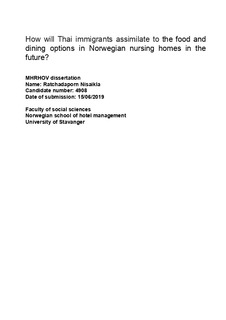How will Thai immigrants assimilate to the food and dining options in Norwegian nursing homes in the future?
Master thesis
Permanent lenke
http://hdl.handle.net/11250/2621599Utgivelsesdato
2019-06Metadata
Vis full innførselSamlinger
- Studentoppgaver (SV-NHS) [561]
Sammendrag
Malnutrition is a common problem among elderly residents in nursing homes. It affects the quality of life as well as the functionality of the patients, thereby affecting both the patients and the institutions with large workloads. Nursing homes are not widespread in many places of the world, where it is common to take care of their elderly at home. Elderly immigrants from these places can be seen as vulnerable consumers, where the change of environment and dining habits when institutionalized may have an even larger effect than for the rest of the population.
This study focuses on the Thai immigrant community in Norway, which is a rather small community of mostly first-generation immigrants. There are currently very few elderly Thai immigrants. Therefore the study aims to analyse the assimilation and dining habits of the Thai immigrant community in Norway and relate the findings to the context of nursing homes. Seventeen interviews were conducted in Thai community gatherings in the county of Rogaland, Norway.
The study was inconclusive with regards to how the Thai immigrant community will adapt to the dining options in Norwegian nursing homes in the future. However, there were interesting discoveries with regards to the use of condiments, the fear of loneliness, the view on Norwegian food culture and the importance of food for the sense of cultural heritage.
Beskrivelse
Master's thesis in international hospitality management
